BY TFN STAFF
Combatting food insecurity by helping people plant home gardens in low-income neighborhoods. Working to help landscape workers embrace practices that protect their health and improve local ecosystems. Creating spaces that encourage community engagement and a sense of connection to the places where we live, work and play.
These community-based approaches that address climate impacts, strengthen local economies and improve the well-being of all residents are the latest round of projects that will receive funding thanks to the Partners for Places matching grant program.
Nine cities in the U.S. will receive more than $1.3 million to support these sustainability efforts — which focus largely on empowering and engaging low-income neighborhoods, embedding racial equity into local decision-making and building partnerships between government sustainability offices, place-based foundations and community-led frontline groups.
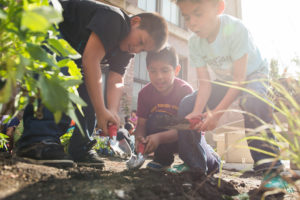
Engaging Communities, Building Partnerships
In Louisville, Ky., the grants will fund the construction of a sustainable, community-driven green space on what is currently a vacant parking lot adjacent to a community garden in the heart of the Parkland neighborhood — a historically Black community that has suffered economic disinvestment over the decades and which currently has no public parks — transforming the asphalt expanse into a welcoming and well-shaded cultural plaza with a playground and space for outdoor performances, retail vendors and open-air seating.
In Charlottesville, Va., the funds will go toward planning for deep energy efficiency through Passive House certification for over 100 new residential homes in the low-income housing community of Friendship Court. Deep energy efficiency will be coupled with rooftop solar panels, providing both direct and indirect long-term benefits to community members.
In Princeton, N.J., landscaping and horticultural service workers are at risk of injury from a wide variety of potential hazards in this industry, including exposure to chemicals, noise, machinery, lifting, construction, and weather-related hazards — practices that can also have a negative impact on the local ecosystem. Partners for Places will help fund a project that brings together Hispanic/Latinx rights organizations, environmental sustainability advocates, academic experts, and municipal departments and commissions to raise awareness, integrate day laborer concerns into policy decisions, and educate landscapers and residents to make progress on these issues.
In Miami-Dade County, Fla., where steep economic and racial disparities make access to healthy, affordable food difficult in many neighborhoods, Partners for Places will help community groups build on their efforts to combat food insecurity. This includes educating low-income residents on effective gardening practices through the enhancement of two local community garden spaces that will host free workshops where free fruit trees, vegetable plants and medicinal herbs will be made available to attendees. Additionally, the project will install home gardens for residents in low-income frontline communities in North Miami, Little Haiti, Liberty City, and Overtown, home to a large percentage of Black residents and immigrants from Latin America and the Caribbean.
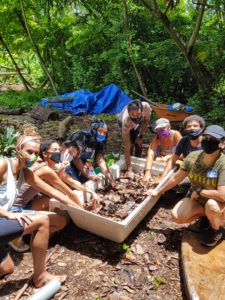
Fostering authentic and inclusive community engagement, especially in areas that have been racially and economically marginalized, is an essential goal of many Partners for Places projects. In Multnomah County, Ore., home to the City of Portland, the grants will be used to create a “third space” — meaning a place for togetherness separate from work or living spaces — for community-based organizations, community members, government and local funders to come together with the intent to co-create intersectional and innovative solutions that advance climate justice.
In Lancaster, Pa., the funding will ensure that the city’s comprehensive plan reflects community consensus about the direction for future growth and development for the next 20 years, including policies around zoning, housing, transportation, the environment, and other factors that impact quality of life.
And in New Orleans, La., Partners for Places will support efforts to advance racial equity in preparing the city for climate change by implementing recommended actions in the report Taking Steps Together on Equity & Climate Change: a Report by and for New Orleanians, released in 2019. (This report was produced through a previous New Orleans project funded by Partners for Places and the Greater New Orleans Foundation).
This round of Partners for Places funding also includes specific support for green stormwater infrastructure projects. The Funders Network and the Urban Sustainability Directors Network are excited to partner with Green Infrastructure Leadership Exchange, a practitioner network that offers a platform for communities to share experiences, circulate ideas, and solve problems together toward finding more sustainable water infrastructure solutions. Staff from this network support Partners for Places outreach efforts and participate in reviewing stormwater infrastructure project proposals.
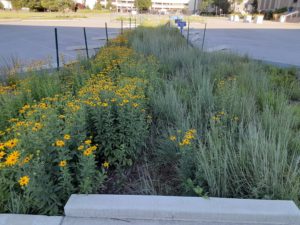
Green Stormwater Infrastructure Grants
Two cities have been selected for these Partners for Places green stormwater infrastructure grants:
Partners for Places will support an initiative in Chicago, Ill., known as Space to Grow, which builds green schoolyards at neighborhood schools located in the communities most vulnerable to urban flooding. The schoolyards provide healthy, engaging places for kids to play and exercise, and also feature areas for learning and exploration, such as outdoor classrooms, native trees and plants and vegetable gardens.
In Gary, Ind., the funds will help maintain green infrastructure through the creation of a shared services model in Northwest Indiana and Illinois’ Calumet region in order to reduce costs across multiple municipalities, including workforce training and partnering with municipalities that are majority Black and/or Latinx that are disproportionately affected by flooding in the region.
About Partners for Places
Partners for Places, led by The Funders Network (TFN) in partnership with the Urban Sustainability Directors Network (USDN), will provide $457,000 in funding to seven cities through the general grant program. This grant cycle also includes $125,000 awarded to the green stormwater infrastructure projects in Chicago and Gary, Ind.
With contributions from local matching funders, a total of $1,334,000 will be committed to fund sustainability projects in these selected cities.
To date, Partners for Places has awarded more than $8 million across North America in this successful matching grant program, leading to more than $17 million in investments.
Since 2012, the matching grant program has helped foster dozens of new partnerships between local government sustainability leaders and place-based funders across the U.S. and Canada — relationships that often continue long after the original Partners for Places project has been completed.
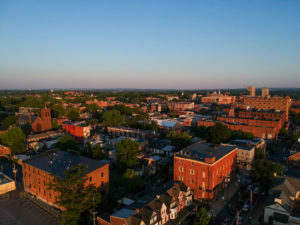
Leading with Racial Equity
In recent years, the grant program has adopted a strategy that leads with racial equity and a sharper focus on how best to advance equitable and sustainable communities.
Starting with this round of general grants announced today, the primary partners have been expanded to also include local frontline community-led groups. These groups consist of any nonprofit organization or group of nonprofit organizations that are made up of or serve people who are impacted by systems of oppression and injustice, economic disadvantage, and environmental harm.
This collaborative partnership model is intended to more deeply embed the values and practice of racial equity into local community decision-making processes.
The matching grant program brings national funder investors together with place-based funders to support local sustainability and climate action projects. The program is supported by five investor foundations: The JPB Foundation, The Kendeda Fund, The Kresge Foundation, The New York Community Trust, and the Pisces Foundation.
Partners for Places will open a new round of funding for the general grant program in early 2021.
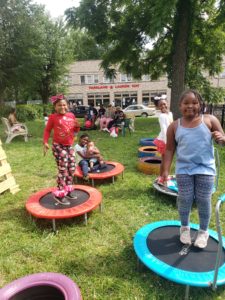
The latest Partners for Places general grant recipients and their matching funders are:
- Charlotesville, Va. ($150,000): To provide long-term benefits to the residents of Friendship Court, a low-income housing community, by deploying full rooftop solar panels on new residential buildings that implement energy efficient “passive house” design principles. Frontline community-led group: Piedmont Housing Alliance. Matching funder: Anonymous at the request of the funder ($300,000).
- Lancaster, Penn. ($75,000): To help create a comprehensive plan that is inclusive and equitable by ensuring its core values, priorities, and policies are informed by robust community engagement. Frontline community-led group: Lancaster Equity Community Development Corporation. Matching funder: High Foundation ($75,000).
- Louisville, Ky. ($42,000): To bring partners and community members together to realize a long-held vision of a green, active and engaging civic space that will support efforts to restore the Parkland neighborhood’s once-thriving center. Frontline community-led groups: Louisville Community Design Center DBA Center for Neighborhoods, and Parkland Business and Development Association. Matching funder: Community Foundation of Louisville ($42,000).
- Miami-Dade County, Fla. ($25,000): To combat food insecurity and promote environmental equity by educating residents on effective gardening practices through workshops and installation of home gardens in four low-income communities. Frontline community-led groups: Green Haven Project, Grow Roots Miami, Plant Philosophy, Neat Streets Miami, and Urban Oasis Project. Matching funder: The Miami Foundation ($25,000).
- Multnomah County, Ore. ($75,000): To establish a “third space” — a social space distinct from home or workplace — for frontline communities and local government to come together to co-create intersectional solutions that advance climate justice. Frontline community-led group: Coalition of Communities of Color. Matching funder: Meyer Memorial Trust ($75,000).
- New Orleans, La. ($60,000): To implement recommendations from Taking Steps Together on Equity and Climate Change: A Report by and for New Orleans selected by frontline leaders and advocates, and integrate those report recommendations into the city’s updated Climate Action Plan. Frontline community-led group: Deep South Center for Environmental Justice. Matching funder: Greater New Orleans Foundation ($60,000).
- Princeton, N.J, ($30,000): To improve the health and safety of landscape workers and address suburban landscaping practices that negatively impact the local ecosystem by bringing together Hispanic/Latinx rights organizations, environmental sustainability advocates, academic experts and municipal departments and commissions to raise awareness, integrate day laborers’ concerns into policy decisions, and educate landscapers and residents to make progress on these issues. Frontline community-led group: Latin American Legal Defense and Education Fund, Sustainable Princeton, and Unidad Latina en Acción NJ. Matching funders: Fox Foundation, and Leen Foundation ($25,000).
The latest Partners for Places recipients for green stormwater infrastructure projects and their matching funders are:
- Chicago, Ill. ($100,000): To use green stormwater infrastructure to improve Chicago’s climate resilience by transforming Chicago schoolyards into vibrant green spaces for play and learning. Matching funder: Hamill Family Foundation ($100,000).
- Gary, Ind. ($25,000): To develop a practicable solution to successfully maintain green stormwater infrastructure by using shared services that capitalize on public-private partnerships, cross-sector and bi-state collaboration, workforce development and new job opportunities, which can be replicated throughout the region. Matching funder: The Legacy Foundation ($25,000).
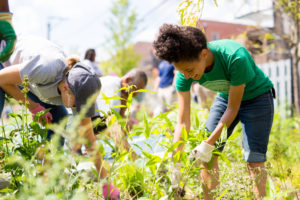
Additional Resources
Partners for Places Grants Map & Idea Bank
The Funders Network recently launched a new interactive Partners for Places Grants Map as well as a robust reboot of the Partners for Places Idea Bank featuring a searchable database of completed projects.
Visit the Partners for Places homepage on the TFN website to view interactive Grants Maps for both U.S. and Canadian projects that have been supported by the matching grants program.
Each completed project on the map includes a link that will take you to that project’s entry on the Partners for Places Idea Bank. (You can also access the Idea Bank directly via the pulldown menu at the top of the page, or via resource links embedded on the Partners for Places homepage.)
More than 100 completed Partners for Places projects are featured in the Idea Bank, including a description of the project, matching funders, lessons learned and additional resources.
Partners for Places Mini Grants
Partners for Places Mini Grants are designed to spark new relationships or deepen existing connections that will hopefully help these communities develop a successful Partners for Places project proposal in the future. Learn about the latest Mini Grants recipients here.
In the News
Partners for Places has been featured in Inside Philanthropy. Read the most recent story here.
Contact Us
For questions about the Partners for Places grants program, please reach out to Ashley Quintana.

[…] Lancaster is one of nine cities in the U.S. that will receive more than $1.3 million total to support sustainability efforts. Read more about the other grantees at http://www.fundersnetwork.org/meet-the-new-partners-for-places-grantees-nine-communities-more-than-1-3-mill…. […]